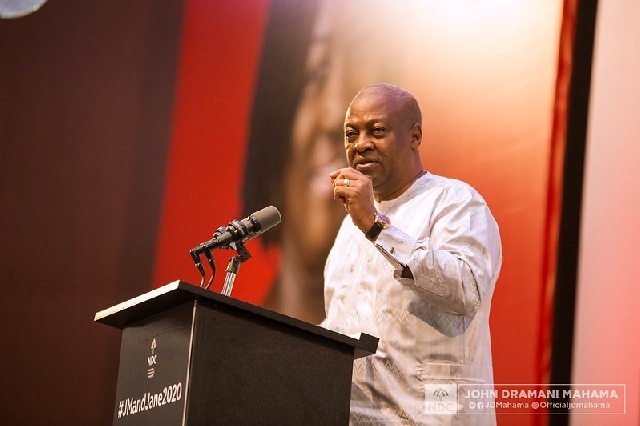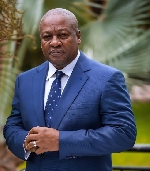24-hour economy idea was in NDC's 2020 manifesto - Mahama says it was birthed by NDPC's 40-year plan under his gov't
 Stripped to the essentials, Mr Mahama explained that the 24-hour policy will be anchored as an economy that runs around the clock with a three-shift work schedule in many sectors
Stripped to the essentials, Mr Mahama explained that the 24-hour policy will be anchored as an economy that runs around the clock with a three-shift work schedule in many sectors
Former President John Mahama has said his idea of a 24-hour economy "may have finally resonated with Ghanaians" and "may be classified as an idea whose time has come due to Ghana’s self-inflicted economic crisis today" because the same idea "was well-thought-through and captured on page 105 of the NDC’s 2020 People’s Manifesto".
Speaking at the 9th Ghana CEO Network Business Cocktail, Mr Mahama said: "Indeed, its roots emanate from the 40-year National Development Plan the National Development Planning Commission (NDPC) put together when I was President. Unfortunately, the present government discarded the 40-year plan and replaced it with a Ghana Beyond Aid plan that has turned Ghana into a beggar nation".
Stripped to the essentials, Mr Mahama explained that the 24-hour policy will be anchored as an economy that runs around the clock with a three-shift work schedule in many sectors.
The intent, he said, "is to transform Ghana into, first, a self-sufficient and then an export-led economy".
"To be clear, we are not creating a command economy with centralised planning. That would be at variance with the Social Democratic ideology of the NDC", he clarified.
Specifically, he said: "We will combine government support and private sector involvement to realise the 24-hour economy; we will establish a comprehensive policy framework that supports the growth of a 24-hour economy; legislation will be introduced to support businesses operating 24/7, including labour laws, tax incentives, and regulations that ensure workers’ rights and protection; and favourable tax policies will be adopted so that businesses can reduce their operational cost and stay competitive".
Additionally, he said: "Companies that sign up for the 24-hour economy policy will enjoy smart metering calibrated to charge a lesser tariff (per KW/h) for power consumed during off-peak hours at night based on a Time of Use (ToU) tariff system" while "financing support will be provided for certain strategic agro-processing firms and manufacturing companies to boost production for value addition, self-sufficiency, and increased exports".
Knowing that the government is the biggest spender in the economy,Mr Mahama said "we shall boost demand by ensuring that all government ministries, agencies, assemblies, and state-owned enterprises buy made-in-Ghana goods and procure the services of Ghana-based firms where available".
Further, he noted a future government of his "will address safety and security measures to ensure smooth operations across all sectors during extended hours".
"We will see the availability of the necessary infrastructure, such as transportation networks, public amenities, and security systems, including a well-regulated and monitored private security architecture to facilitate round-the-clock activities."
"Technology and digital infrastructure investment would also be prioritised to enable automation and seamless operations", he noted.
He also indicated that: "We cannot have a successful 24-hour economy without an aggressive expansion in our exports. I will, therefore, personally chair an Accelerated Exports Development Council (AEDC), which will meet quarterly to review initiatives for expanding Ghana’s exports under the ECOWAS Trade Liberalisation Scheme (ETLS) and the African Continental Free Trade Agreement (AfCFTA)".
Mr Mahama said "there will be extensive consultation and collaboration with various stakeholders, including CEOs, businesses and workers’ unions" and "businesses will be encouraged to empower the workforce with the necessary skills and training to thrive in a 24-hour economy, focusing on the most impacted sectors."
He mentioned that sanitation, cleaning services, garbage collection and environmental protection will also form "a significant part of the 24-hour economy".
"Financial services at the port, shipping agents, and customs will be enabled to work additional shifts at night and at weekends to allow for the 24/7 clearing of goods at our ports. This will help reduce demurrage charges on importers and reduce congestion at our ports", he added.
Mr Mahama clarified that "there will be no limit to the sectors the 24-hour economy initiative will target. And the benefits will be enormous. Through the 24-hour economy, we will create new, decent, and well-paying jobs for the youth, reduce unemployment, which is a significant challenge,
and improve the living standards of Ghanaians".
Also, he said "the expanded range of operating or working hours will increase productivity and fully utilise all resources, including infrastructure. The 24-hour economy will provide greater flexibility and convenience for workers and allow citizens to access goods and services anytime".
"We will improve infrastructure, lighting, and security at entertainment districts such as the Osu Oxford Street, Abeka LaPaz, East Legon Lagos Avenue, etc., to allow operations throughout the night – Consider hospitality, transportation, and security, including a well-regulated and monitored private security establishment. These will enhance the consumer experience and create a thriving and dynamic economy".
"Let me add that the 24-hour economy will also attract foreign direct investment to stimulate the local economy and create more employment opportunities for Ghanaians", Mr Mahama added.
Source: classfmonline.com
Trending News

Mahama announces bold reforms to end illegal mining in forest reserves
01:55
President Mahama will act fairly on Chief Justice suspension- Defence Minister assures Minority
03:36
Green Africa Youth Organisation wins £1 million to scale environmental innovations
03:20
Patrick Boamah appointed ambassador for 2025 Christian Home Week Celebrations
03:45
Police writes to Speaker to release Afenyo-Markin for alleged assualt investigations
05:07
Mahama attends inauguration of Gabon's president-elect in Libreville
02:50
Multi-million dollar Aayalolo BRT faces criticism over overloading and deteriorating service quality
15:20
Asset declaration: Mahama sanctions defaulting appointees; seizes 3 months’ salary to support Ghana Medical Trust Fund
02:51
Paul Afotey Quaye receives unanimous endorsement as Krowor MCE amidst some mixed reactions
15:44
A new dawn: Joyce Bawah Mogtari hails President Mahama’s bold start
17:10



